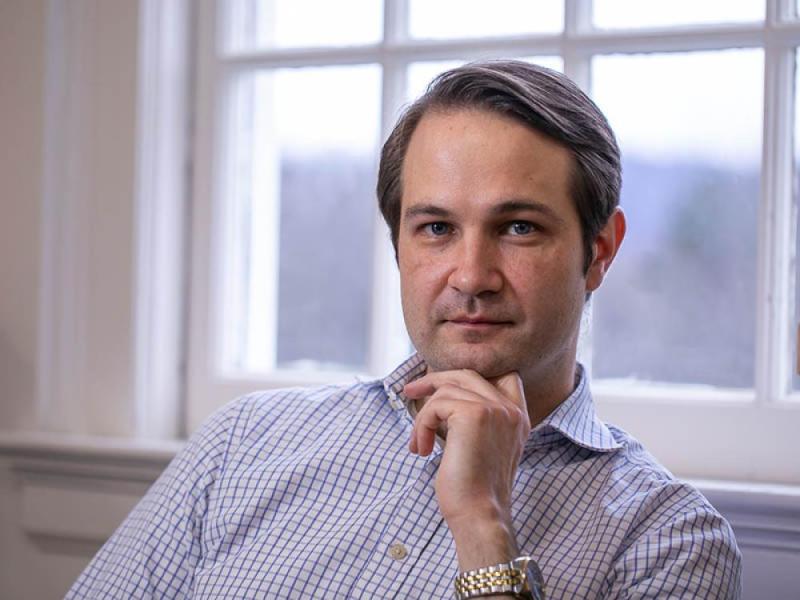Math Professor Wins NSF CAREER Award for His Work Researching the Mathematics of Entropy

For many computer scientists, the future is quantum computing – a concept that would harness the properties of quantum mechanics to create supercomputers that could perform the kind of advanced calculations today’s computers would take hundreds or even thousands of years to solve. Unfortunately, as the physicist Richard Feynman once said, “Nobody understands quantum mechanics.”
Nearly thirty years after Feynman made his observation, there’s still much that scientists don’t understand about the properties of the kind of quantum systems that would form the foundation of a fundamentally new kind of computer, but the work of University of Virginia mathematician Ben Hayes could help science better understand some of the properties of those systems, and that could bring physicists and engineers at least a few steps closer to making quantum computing a reality. An assistant professor in UVA’s College and Graduate School of Arts & Sciences, Hayes recently won the CAREER award for his research in this area, the National Science Foundation’s most prestigious honor for faculty who are still in the early stages of their careers.
Hayes’ research is focused on aspects of mathematics known as functional analysis, or more specifically, operator algebras, which are used to describe or predict the movements of elements in a physical system as that system changes or evolves over time. Imagine elements like the balls on a pool table, the molecules of cream in a cup of coffee, or the stars in a galaxy, except that Hayes is interested in systems like quantum mechanics that contain components with properties that can’t be explained using just two or three dimensions.
Hayes applies his research to the study of ergodic theory, which is concerned with understanding and measuring the disorganization and randomness, or entropy, of those physical systems. Using probability, geometry and infinite matrices, he’s developing new ways to describe those complex environments that can’t be described using conventional mathematics.
“When you work in calculus you work in finite dimensions. In multivariable calculus, you’re describing shapes in three-dimensional space, but things are often modeled by more than three dimensions,” Hayes said. “With operator algebras we’re focused on infinite dimensions.”
Advancing Two Disciplines
In quantum mechanics, one of those systems whose characteristics are profoundly complex, many unanswered questions remain. The connections Hayes is making between ergodic theory and operator algebras, however, have put him at the forefront of a field of mathematics looking for tools that may help scientists find some of the answers they need.
“Operator algebras form the foundation for quantum mechanics,” Hayes said. “The work I'm doing could be conceived as trying to you know understand the evolution of these quantum systems.”
For physicists, understanding the nature of the randomness or entropy of quantum systems – or being able to predict the unpredictability in them – is an important part of being able to use them as the foundation for the kind of computers that could create virtually unbreakable encryption or speed up the pace of drug testing and discovery. Some proponents of quantum computing also suggest that this new computing paradigm could vastly improve the science of modeling financial markets, improve the efficiency of manufacturing processes and manage global distribution networks. Others feel that, regardless of the practical applications of a working quantum computer, even just the ability to accurately characterize the properties of a quantum system would represent a significant step forward for physicists looking to prove Feynman wrong.
“The space Ben works in is very ‘exotic,’ and its rules correspond to certain scenarios in quantum mechanics. Any exact result that mathematics can offer would tremendously benefit physicists in building their understanding of these systems,” said Marija Vucelja, a theoretical physicist with UVA’s Department of Physics and another recent winner of the NSF’s CAREER award for her work in statistical physics. “Ben is defining and quantifying analogs of entropy on operator algebras. Entropy tells us how much randomness we have in a system or how much information we are missing, and Ben’s work in this area could lead us to deeper insights into the statistics of quantum systems.”
Building Community in the Classroom
In order to win a CAREER award, early-career faculty need to be at the forefront of their fields, and Hayes’ work is breaking new ground in mathematics, but CAREER winners are also chosen for their leadership in the classroom. In addition to using the funding the award provides for his research, Hayes will use the grant to develop a teaching and diversity seminar at the University and to expand his departments summer bridge program to help make the study of math at UVA more accessible to underrepresented groups and to help close the learning gaps between students entering the University from different backgrounds.
According to Hayes, one of the keys to improving the gender and racial diversity of fields like mathematics and the sciences is to focus on developing stronger communities of scholars.
“There's a tremendous social aspect to mathematics,” Hayes said. “I don’t think that’s something a lot of people realize, so I think it's very important to get students feeling like they belong in the department as early as possible.”
“The NSF CAREER awards are the highest awards given to young scientists beginning their careers. These scientists are role models both in education and research, and by that description the award speaks for itself,” said Ken Ono, a world-renowned mathematician and chair of UVA’s Department of Mathematics. “Ben is a leader in diversity, equity and inclusion. He's one of the faculty co-sponsors for UVA's chapter of Women in Mathematics, and he’s involved in a number of community-building initiatives that are very important to us, and somehow, he finds time to be involved in these things and to maintain the highest level of research. We're proud to have him here at UVA.”




